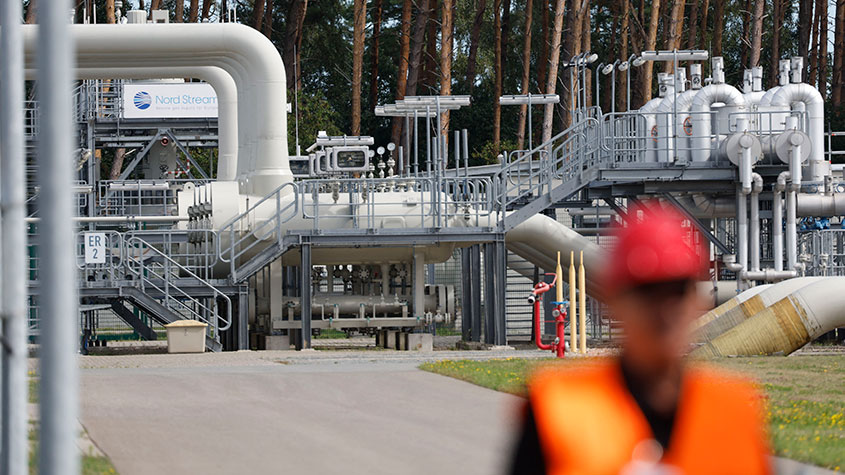The companies that could benefit from Russia’s gas war
It’s hard to be an investor right now, but some companies have brighter prospects than others.


Get the latest financial news, insights and expert analysis from our award-winning MoneyWeek team, to help you understand what really matters when it comes to your finances.
You are now subscribed
Your newsletter sign-up was successful
Want to add more newsletters?

Twice daily
MoneyWeek
Get the latest financial news, insights and expert analysis from our award-winning MoneyWeek team, to help you understand what really matters when it comes to your finances.

Four times a week
Look After My Bills
Sign up to our free money-saving newsletter, filled with the latest news and expert advice to help you find the best tips and deals for managing your bills. Start saving today!
Russia has finally cut gas supplies to Europe via the Nord Stream 1 pipeline.
Initially, a maintenance issue was blamed for the delayed reopening of the pipeline after three days of scheduled maintenance.
But today Dmitry Peskov, President Vladimir Putin’s spokesman, stated that gas supplies will not resume in full until the “collective west” lifts sanctions against Moscow over its invasion of Ukraine.
MoneyWeek
Subscribe to MoneyWeek today and get your first six magazine issues absolutely FREE

Sign up to Money Morning
Don't miss the latest investment and personal finances news, market analysis, plus money-saving tips with our free twice-daily newsletter
Don't miss the latest investment and personal finances news, market analysis, plus money-saving tips with our free twice-daily newsletter
While the full shutdown has come as a bit of a shock, it wasn’t totally unexpected. Europe has been planning for this worst-case scenario since Russia invaded Ukraine at the beginning of the year.
Russia’s gas war with Europe has been a long time coming
The good news is that Europe has not been caught completely off guard. Last week, after several frantic months, the German authorities announced the country’s gas storage facilities were filling up faster than expected before winter, and had reached the 85% full target a month ahead of schedule.
Gas consumption has also slumped. Industry gas consumption fell by 21% in July year-on-year, according to Germany's BDI industry association. Other European countries have also announced plans to reduce gas and energy consumption, which should help improve the overall picture on the demand side.
On the supply side, Germany has contracted five floating LNG regasification vessels to diversify its energy sources. These vessels are coming online over the next 12 months and have the capacity to meet around 20% of the country’s natural gas needs.
The UK and Norway have both stepped up their efforts to replace Russia’s role as Europe’s leading gas supplier. Gas production from the North Sea jumped by a quarter in the first half of 2022, and the UK has become a net gas exporter to Europe (around 50% of the country’s gas demands are covered by North Sea production). Norway has also increased supply volumes to the region.
Avoiding the fallout will be very difficult
Europe is far less dependent on Russian gas than it was a year ago, but this move will almost certainly hit European economies.
Gas consumption is falling in Germany due to demand destruction. Factories cannot afford to keep operating with prices where they are today. There are also growing concerns that volatility in the power market will lead to stress in the financial system (electricity producers tend to hedge prices using derivatives, which means they are exposed to margin calls if volatility jumps).
European gas futures jumped 30% after Russia’s announcement (UK futures jumped a similar amount) reflecting the market’s nervousness. Prices are trading around the €258MWh mark, up 2,066% from this time in 2019, although they’re still below the record high of €332MWh last week.
I’m an optimist at heart, and I genuinely believe that this crisis will produce some positives.
Renewable energy initiatives are being turbocharged, and governments as well as customers are rushing to come up with ways to reduce energy consumption. And if the Western world can reduce its dependence on fossil fuels and countries like Russia, then that’s only going to be good for economic growth and democracy in the long term.
Still, even as an optimist, I can’t see how the world, and in particular, Europe, is going to escape a period of economic hardship following this energy price shock.
It’s not just Europe that’s feeling the pain. The mad scramble for gas has sent the price of all fuel types rocketing around the world. Tight gas markets have sent buyers back to coal, and surging demand has pushed up prices by more than 700% in the past two years.
Only two years ago analysts were predicting coal mines would have to close the world over due to terminally declining demand. Now they’re making record profits.
Finding the companies and sectors that will profit
The big challenge for investors is how to deploy capital in this environment. Hydrocarbon producers are an obvious bet, although as we’ve seen in Europe, the threat of windfall taxes is now becoming a reality.
And it’s the same with renewable energy producers. Windfall taxes and energy price caps are on the table, making it difficult to value these businesses.
Elsewhere, many industrial companies, especially in Europe, are facing terminal price pressures. Consumer goods companies, retailers and banks may also all suffer as inflation saps consumer purchasing power. In fact, there are not many sectors that I think are unlikely to escape the coming storm.
One sector that might come out stronger is the oil services sector.
The companies that supply the nuts, bolts, pipes and survey services for both the oil and gas and coal industries are unlikely to face as much backlash as their peers (primarily because they tend to be less profitable). Nevertheless, high energy prices are stimulating more activity in the sector, and this is leading to rising profits at service companies.
Oil field services company Haliburton (NYSE: HAL) reported a 55% increase in profits during the first half of 2022. UK-listed John Wood Group (LSE: WG) reported a strong profit in its first half up from a loss in the same period last year following significant contract awards from the likes of INEOS, Chevron and Equinor.
It might also be worth taking a closer look at companies in the renewable energy sector that fulfil the same role.
XP Power (LSE: XPP) makes transformers that help transmit power from the generators to the grid. Copper miners such as Teck Resources (NYSE: TECK) or Antofagasta (LSE: ANTO) could also benefit from rising demand for copper in renewables projects (copper prices have been under pressure recently but that appears set to change).
For investors willing to take a bit more risk, Glencore (LSE: GLEN) could be a great option. The company is generating record profits, (and returning a large percentage of this income to investors) but more importantly its well versed in dealing with political risks, such as windfall taxes and regulations.
Get the latest financial news, insights and expert analysis from our award-winning MoneyWeek team, to help you understand what really matters when it comes to your finances.

Rupert is the former deputy digital editor of MoneyWeek. He's an active investor and has always been fascinated by the world of business and investing. His style has been heavily influenced by US investors Warren Buffett and Philip Carret. He is always looking for high-quality growth opportunities trading at a reasonable price, preferring cash generative businesses with strong balance sheets over blue-sky growth stocks.
Rupert has written for many UK and international publications including the Motley Fool, Gurufocus and ValueWalk, aimed at a range of readers; from the first timers to experienced high-net-worth individuals. Rupert has also founded and managed several businesses, including the New York-based hedge fund newsletter, Hidden Value Stocks. He has written over 20 ebooks and appeared as an expert commentator on the BBC World Service.
-
 Last chance to invest in VCTs? Here's what you need to know
Last chance to invest in VCTs? Here's what you need to knowInvestors have pumped millions more into Venture Capital Trusts (VCTS) so far this tax year, but time is running out to take advantage of tax perks from them.
-
 ISA quiz: How much do you know about the tax wrapper?
ISA quiz: How much do you know about the tax wrapper?Quiz One of the most efficient ways to keep your savings or investments free from tax is by putting them in an Individual Savings Account (ISA). How much do you know about ISAs?
-
 Barings Emerging Europe trust bounces back from Russia woes
Barings Emerging Europe trust bounces back from Russia woesBarings Emerging Europe trust has added the Middle East and Africa to its mandate, delivering a strong recovery, says Max King
-
 No peace dividend in Trump's Ukraine plan
No peace dividend in Trump's Ukraine planOpinion An end to fighting in Ukraine will hurt defence shares in the short term, but the boom is likely to continue given US isolationism, says Matthew Lynn
-
 Investors need to get ready for an age of uncertainty and upheaval
Investors need to get ready for an age of uncertainty and upheavalTectonic geopolitical and economic shifts are underway. Investors need to consider a range of tools when positioning portfolios to accommodate these changes
-
 EPC rating standards for private landlords set for major overhaul amid ‘biggest ever’ energy efficiency push
EPC rating standards for private landlords set for major overhaul amid ‘biggest ever’ energy efficiency pushNews The government wants landlords to achieve an EPC rating of at least C in private rented homes. The policy revives plans previously put forward by the Conservatives.
-
 Halifax: House price slump continues as prices slide for the sixth consecutive month
Halifax: House price slump continues as prices slide for the sixth consecutive monthUK house prices fell again in September as buyers returned, but the slowdown was not as fast as anticipated, latest Halifax data shows. Where are house prices falling the most?
-
 Rents hit a record high - but is the opportunity for buy-to-let investors still strong?
Rents hit a record high - but is the opportunity for buy-to-let investors still strong?UK rent prices have hit a record high with the average hitting over £1,200 a month says Rightmove. Are there still opportunities in buy-to-let?
-
 Pension savers turn to gold investments
Pension savers turn to gold investmentsInvestors are racing to buy gold to protect their pensions from a stock market correction and high inflation, experts say
-
 Where to find the best returns from student accommodation
Where to find the best returns from student accommodationStudent accommodation can be a lucrative investment if you know where to look.